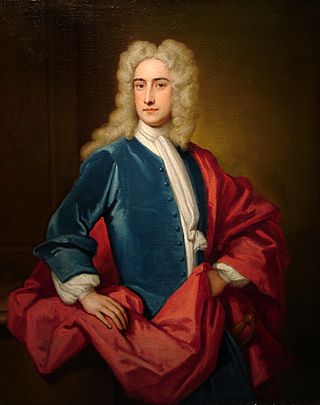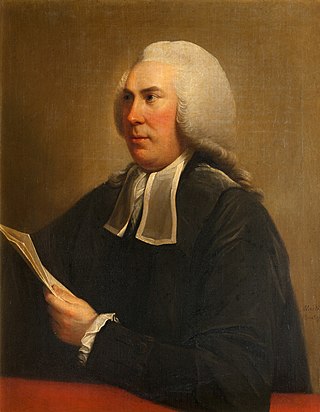Life
He was the third son of Sir Robert Pringle,1st Baronet,of Stitchel,by his wife,Margaret,daughter of Sir John Hope,Lord Craighall,a lord of session;and a younger brother of Sir Walter Pringle of Lochton,Lord Newhall. After studying at the University of Leyden,which he entered 19 November 1687,he took service under William,Prince of Orange,with whom he went over to England at the Glorious Revolution of 1688. [1]
Pringle was in practice as an attorney,and was then appointed under-secretary of state for Scotland in 1695. In this capacity he attended King William in his campaigns abroad. [2]
On 18 May 1718 Pringle was appointed Secretary at War,and he held that office until 24 December. Subsequently he became registrar-general of the shipping. [1]
Pringle died at Rotterdam on 13 September 1736. [1]

Samuel Sandys, 1st Baron Sandys, was a British Whig politician who represented Worcester in the House of Commons from 1718 until 1743, when he was created Baron Sandys. He held numerous posts in the government of the United Kingdom, namely Chancellor of the Exchequer, Leader of the House of Commons, Cofferer of the Household and First Lord of Trade. He was also a justice in eyre.

William Kerr, first Earl of Lothian of a new creation (1605–1675) was a Scottish nobleman.
William Wogan was an Irish religious writer, close to a number of leading evangelicals of his time, and sympathetic with early Methodism.
The Treaty of Uxbridge was a significant but abortive negotiation in early 1645 to try to end the First English Civil War.
William Shaw Mason (1774–1853) was an Irish statistician and bibliographer. Amongst his works was A Statistical Account or Parochial Survey of Ireland.
The Imperial Dictionary of Universal Biography was a biographical dictionary of the nineteenth century, published by William Mackenzie in Glasgow.
Annals of Philosophy; or, Magazine of Chemistry, Mineralology, Mechanics, Natural History, Agriculture and the Arts was a learned journal founded in 1813 by the Scottish chemist Thomas Thomson. It shortly became a leader in its field of commercial scientific periodicals. Contributors included John George Children, Edward Daniel Clarke, Philip Crampton, Alexander Crichton, James Cumming, John Herapath, William George Horner, Thomas Dick Lauder, John Miers, Matthew Paul Moyle, Robert Porrett, James Thomson, and Charles Wheatstone.

The Regius Professorship of Hebrew in the University of Oxford is a professorship at the University of Oxford, founded by Henry VIII in 1546.
Sir James Lockhart, Lord Lee was a Scottish courtier, politician and judge, a royalist commander of the Wars of the Three Kingdoms.

Alexander Murray, Lord Henderland was a Scottish judge and politician.

Sir Walter Pringle, Lord Newhall (1664?–1736) was a Scottish lawyer and judge.
William Ramsay, 1st Earl of Dalhousie was a Scottish nobleman, army officer and politician.

The 1696 Jacobite assassination plot was an unsuccessful attempt led by George Barclay to ambush and kill William III and II of England, Scotland and Ireland in early 1696.
George Preston was a Scottish army officer, known for his involvement in the Jacobite risings.
Sir John Preston, Lord Fentonbarns, of Penicuik, was a Scottish lawyer and judge who became lord president of the court of session.

Sir Robert Cavendish Spencer (1791–1830) was an English officer of the Royal Navy. Well connected by birth, he made a naval career, which attracted the sons of the nobility and also of those from naval backgrounds, to serve under him and, despite liberal politics, worked as a reforming administrator with the future William IV of the United Kingdom.
John Puleston (c.1583–1659) was a Welsh barrister and judge.
Sir James Nasmyth, 1st Baronet, also known as James Naesmith, was a successful Scottish lawyer.
Sir Elisha Leighton was a Scottish courtier and government official.
Sir Stanier Porten was an English government official and diplomat.
This page is based on this
Wikipedia article Text is available under the
CC BY-SA 4.0 license; additional terms may apply.
Images, videos and audio are available under their respective licenses.
![]() This article incorporates text from a publication now in the public domain : Lee, Sidney, ed. (1896). "Pringle, Robert". Dictionary of National Biography . Vol. 46. London: Smith, Elder & Co.
This article incorporates text from a publication now in the public domain : Lee, Sidney, ed. (1896). "Pringle, Robert". Dictionary of National Biography . Vol. 46. London: Smith, Elder & Co.





